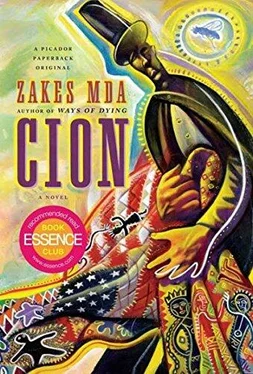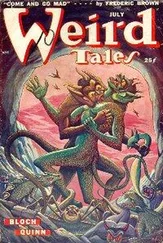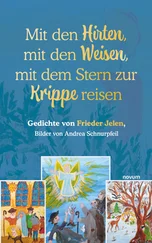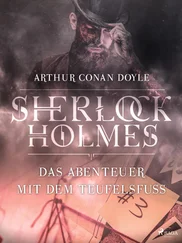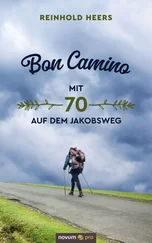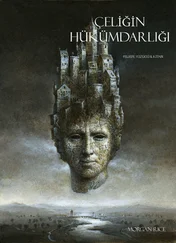At the end of the auction I discover to my surprise that she has been writing my name on the bid, instead of hers. I am not amused at having to pay for the gnome but I don’t argue about it. Later that evening she gives it to her father in my name. In the morning I see it basking in the sun among other gnomes in Mahlon’s garden. The man never thanks me for it.
I do not see Orpah after that for a number of days. But I hear her relentless sitar at odd hours of the day or night. The next time I set my eyes on her we are at the Appalachian Rising Bluegrass Festival at a farm outside Huntington, West Virginia. She is with Nathan, who is holding her sitar in a case. I am here with Obed and had no idea Orpah would be here too. I am not one for music festivals but Obed begged me to come with him. He had bought tickets for himself and Beth Eddy, but at the last minute she told him she couldn’t make it because of a family commitment. He also felt that Ruth would be more comfortable parting with her GMC for the better part of the day and night if she knew I’d be wherever the GMC was. Obviously the young man has an exaggerated impression of the esteem in which Ruth may or may not hold me.
Orpah looks like a Gypsy queen in her fuchsia skirt, sequinned silver top and coin hoop earrings that almost touch her shoulders. She is ill at ease.
People are enthralled by a band of five — a sliding guitar, a banjo, a seventy-string hammer dulcimer, a fiddle and an acoustic guitar — playing Celtic traditional music. When they play bluegrass it is heavily Irish-traditional. This prompts a group of men to mount the makeshift stage and begin clogging. There are yells of excitement when the champion fiddler takes a solo while he joins the clogging.
This is my first bluegrass festival and I am enjoying it.
“Bluegrass is human,” says Orpah. “It’s about people, that’s why.”
We get pop and some hot dogs. The two guys are on their best behavior. I would have thought they would be drowning themselves in beer by now. Maybe it’s Orpah’s influence on Nathan.
We walk to another part of the festival and here a different band is on the stage. In addition to the banjo and three fiddles this one also has a ukulele and a mandolin. A woman vocalist with a gravelly voice is very popular with the crowd. People are clapping their hands and stamping their feet.
There are many other stages, but we return to the first one because there is an open mike at this time.
After much persuasion from the three of us, with Nathan holding her to the promise she made before they left Kilvert that she would play for the public for the first time in her life, Orpah takes the stage with her sitar. Its whines bring everyone to attention.
An old guy with a sliding guitar cannot help but join her. So does a flute, a lap dulcimer, a fiddle and a banjo. And soon the impromptu band is giving bluegrass standards a tone that has never been heard before. I don’t know what they call an event like this in the bluegrass culture. I would call it a jam session if it was jazz. And it is Orpah’s sitar that breaks from the standards in improvised leaps before it returns to them to find the graybeards just ready to reincorporate it in the song with their varied instruments.
The audience doesn’t dance. Doesn’t yell. Doesn’t clap or sing along. Everybody is transfixed. Including us. I am just open-mouthed. We are all mesmerized by what we hear. When the song comes to an end there is utter silence for some time. Then an outburst of cheers and screams. There are tears in my eyes. Nathan is beaming with pride. Obed’s face displays disbelief.
The crowd doesn’t want Orpah to leave the stage even after open mike time. Band members crowd around her asking for her contact details because they’d like to invite her to join them for this or that gig. At this point Nathan moves forward and takes charge of the situation. Anyone who wants to contact Orpah with any proposal should do it through him. But she dashes away in a huff, elbowing her way through the crowd. The three of us run after her.
“What’s up with you, Orpah?” demands Obed when we catch up with her.
“Where do you get off being my owner?” she asks, glaring at Nathan.
“Someone’s gotta look after you, Orpah,” says Nathan. “You know how they exploit artists here. ’Specially if they’re naive like you.”
“I ain’t no one’s artist,” she screams. “And no one made you my agent or manager or whatever else you think you are.”
Nathan is taken aback by her vehemence. He was only trying to look after her interests, he says. He accuses her of being ungrateful. After all, she didn’t even want to come to this festival and he persuaded her. It was also his idea that she bring the sitar along to play during open mike. And now that she sees fame beckoning she is turning against him. This annoys Orpah even more. She demands to be taken back to Kilvert. Not by Nathan, but by her brother and me. But Obed is reluctant to leave because he is still enjoying the festival.
“There’ll be other festivals, Obed,” I say. “Please do take your sister home.”
“Who asked you?” Nathan screams at me. “This ain’t Africa. You don’t think I know you’re into her? You don’t think I don’t see the way you’ve been eyeing her?”
A surprised Orpah looks at me questioningly.
Obed is sulking as we walk to the parking area. No one utters a word in the two hours it takes us to get to Kilvert. It is about 8 P.M. when Obed parks the GMC and walks away, perhaps to kill time with a friend.
“You don’t wanna come to my room?” asks Orpah.
I do not show her that I am taken aback.
“Was Nathan right?” she asks. “Was he telling the truth?”
“What if your father finds me there?” I ask, ignoring her question.
“He don’t come at this time,” she says. All so innocently. “Anyways, he don’t come if we don’t plan it that way,” she adds, I suppose as a way of assuring me that we’ll be safe.
Curiosity gets the better of me.
Orpah’s room is a shrine to Marilyn Monroe. There are posters of Marilyn Monroe on the pink walls. Pursed lips blowing into the mike. Andy Warhol’s Marilyn Monroe. Many posters in different sizes. Some mounted. Others framed. The wind blowing her skirt. There is a framed picture of a much younger Orpah — maybe a high school Orpah — standing on an air vent with air blowing her dress in a Marilyn Monroe pose. Norma Jean in two larger than life cardboard cut-outs. There is even a coffee mug with the face of Marilyn Monroe.
I find the presence of this dead woman in Orpah’s room unsettling.
The only chair in the room has piles of pine-scented laundry so I sit on the bed. For a while we don’t know what to do with each other. Then, as if on cue, we simultaneously reach for each other and kiss.
“Oh, I am going to smudge your makeup,” I say. “But what the heck, you only live once.”
I have not been with a woman in the biblical sense since the death of Noria almost two years ago. She is still very much in my mind because I never mourned her. My people have a saying that a doctor cannot heal himself. When a lawyer is charged with a crime he needs another lawyer to defend him. Likewise a professional mourner cannot mourn his own loss. My hope has been that in my wanderings I would find another competent professional mourner who would mourn Noria for me. Until she has been mourned she will continue to be very much part of me. Or so I thought. Until I saw Orpah and heard her sitar. Now my body is raging with desire.
We undress each other in a manner that speaks only of lust. And there in front of me stands the most beautiful thing in the world. But what strikes me about the pubic hair is that it is blonde. Almost golden. And it is gleaming in the light. She notices my astonishment and turns away as if in shame.
Читать дальше
